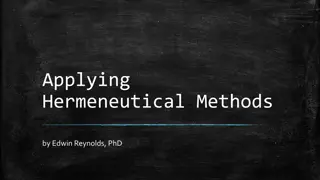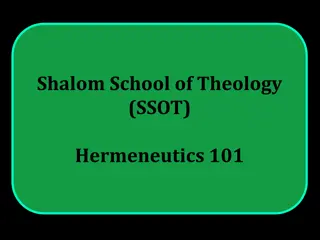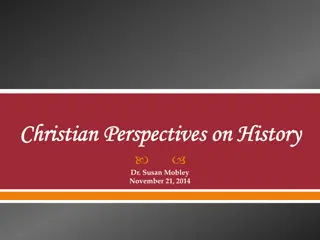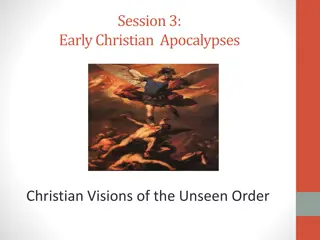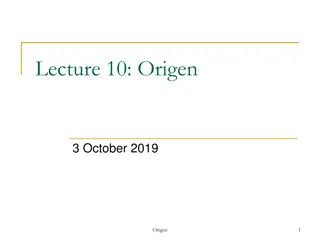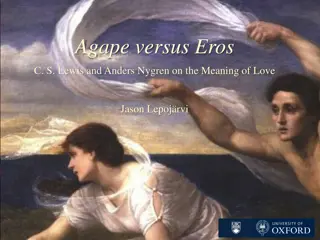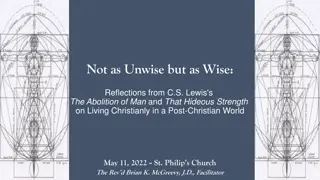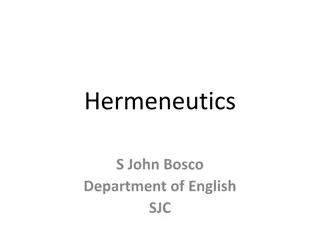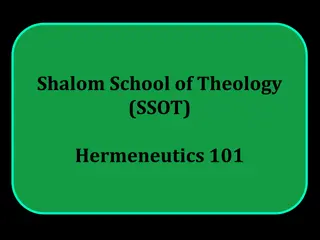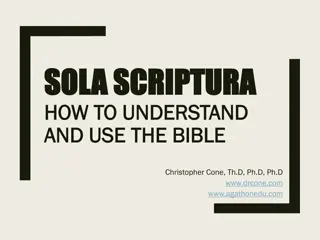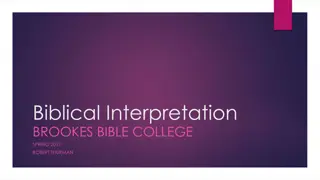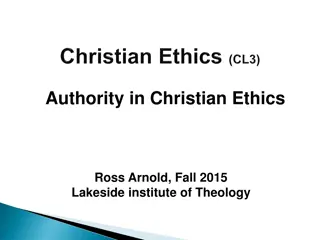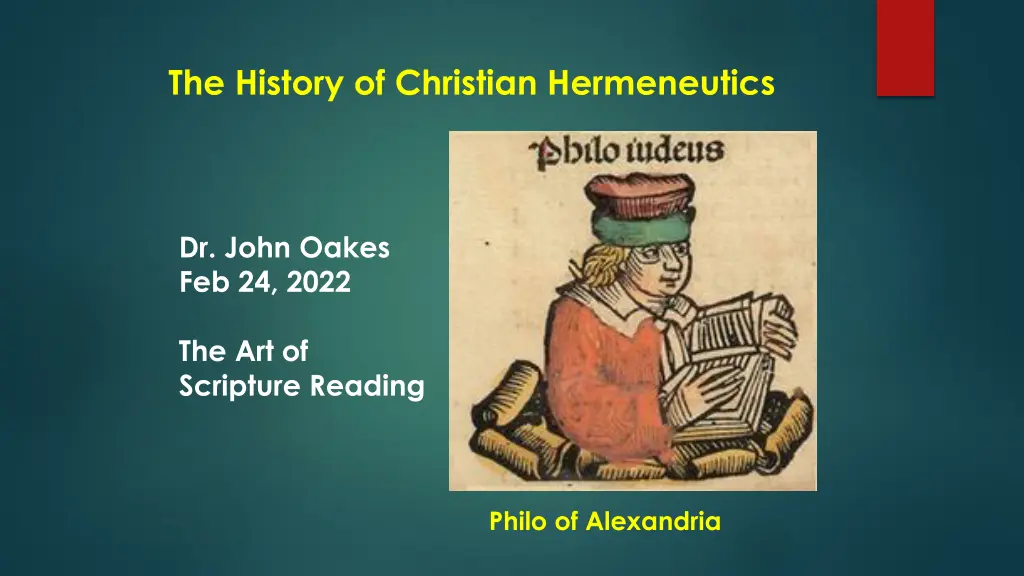
History of Christian Hermeneutics: From Philo of Alexandria to Postmodern Interpretation
Explore the evolution of Christian hermeneutics from 1st-century Judaism to modern postmodern perspectives, highlighting key figures like Philo of Alexandria, Origen, Augustine, Thomas Aquinas, and John Calvin. Discover the varying methodologies, from literal/historical to allegorical interpretation, that have shaped the understanding of Scripture throughout history.
Download Presentation

Please find below an Image/Link to download the presentation.
The content on the website is provided AS IS for your information and personal use only. It may not be sold, licensed, or shared on other websites without obtaining consent from the author. If you encounter any issues during the download, it is possible that the publisher has removed the file from their server.
You are allowed to download the files provided on this website for personal or commercial use, subject to the condition that they are used lawfully. All files are the property of their respective owners.
The content on the website is provided AS IS for your information and personal use only. It may not be sold, licensed, or shared on other websites without obtaining consent from the author.
E N D
Presentation Transcript
The History of Christian Hermeneutics Dr. John Oakes Feb 24, 2022 The Art of Scripture Reading Philo of Alexandria
Resources William Yarchin History of Biblical Interpretation: A Reader Baker Academic Stanley Porter and Jason Robinson Hermeneutics: An Introduction to Interpretive Theory Eerdmans Typology: John Oakes From Shadow to Reality Illumination Publishers Notes: www.evidenceforchristianity.org
Outline Hermeneutics of Judaism in the First Century Early Christian Hermeneutics: Alexandria vs Antioch Medieval Hermeneutics Hermeneutics of the Protestant Reformation: Calvin Modernism: Hermeneutics of Liberal Protestantism Modernism: Hermeneutics of Conservative Protestantism Postmodern Hermeneutics Final Reflections
1st Century Judaism Literal/Historical meaning Historical Prophecy Fulfillment Typological Interpretation Expectation Fulfillment Allegorical Interpretation: Philo of Alexandria
Hermeneutics in the Primitive Church: Alexandria vs Antioch Typology Prophecy Fulfillment: Justin Allegorical: Origen and Alexandria Historical/Literal: Antioch Origen: Body Literal/historical soul typological/figurative spirit deeper, allegorical.
Augustine! 3 lenses Manichaeism Neoplatonism Love Used allegory liberally, but more balanced than Origen
Medieval Hermeneutics Augustine the chief model. Limited original hermeneutics. Thomas Aquinas: Aristotle and Empiricism
Hermeneutics of the Protestant Reformation John Calvin, John Calvin, John Calvin -Return to Antiochene School -Sought original Jewish and Greek meanings of words and idioms
Calvins Hermeneutics --Sought authorial intent -Opposed allegorical interpretation -Word-by-word analysis of text -exegesis = hermeneutics The only business he [the commentator] has is to lay open the mind of the writer he has set out to explain. The more he deviates the reader away from it, the more he deviates from his own purpose, and is sure to wander out of bounds.
The Enlightenment Descartes, Newton sough only what was reasonable in the Bible. The Bible a source of moral teaching rather than theology. Are miracles reasonable? Rene Descartes
Modernism and Liberal Protestantism Friedrich Schliermacher Romanticism Author-oriented hermeneutics Fideism True religion is a feeling, awareness or consciousness of God. Gefuhl
Modernism and Conservative Protestantism Francis Bacon: Inductive analysis Scottish School of Common Sense Philosophy Alexander Campbell Sought the facts of the Bible Command, Example, Necessary Demonstration
Modernism and Conservative Protestantism Authorial intent is the holy grail of Christian hermeneutic. The Bible as a source of propositional truth. Example: Penal Substitutionary Atonement. Charles Finney
Rules of Biblical Hermeneutics 1. Every passage has one meaning. 2. The most obvious meaning is usually the correct one. 3. Always allow the author s explanation to stand. 4. Always interpret a passage within the context of the passage, the book, and the situation. 5. An interpretation of a passage should conform to the environment of the author. 6. Rightly divide books by dispensation, covenant and setting. 7. Interpret every passage in the light of all others.
Rules of Biblical Hermeneutics 8. One passage will often explain another. 9. Let plain passages interpret difficult ones. 10. All passages on a subject must be studied before a conclusion is drawn. 11. Observe the proper balance of scriptural truth. 12. Passages should be interpreted in harmony with the idioms contained. 13. Rightly divide the language (grammar and figures of speech). 14. Learn to distinguish the figurative from the literal. 15. Know the meaning of sentences, phrases and words. 16. Rightly divide books by type of literature
20th Century Hermeneutics: Postmodernism Don t Forget Karl Barth Missional Hermeneutics Narrative, Narrative, Narrative Attention to Culture Bible Not a Source of Theories (ex atonement) Bible Not a Source of Propositional Truth Narrative > Metaphor > Proposition/Theory
Missional Hermeneutics: Examples 1. The women s role John Mark Hicks concludes full egalitarianism based on culture and kingdom narrative. 2. Atonement theory: PSA is either rejected or a small part of the narrative on atonement
Final Reflections Is typological interpretation dead? Can we find a balance between Modernism and Postmodernism? Can narrative and culturally-affected hermeneutics live in peace with modernism and propositional truth?






